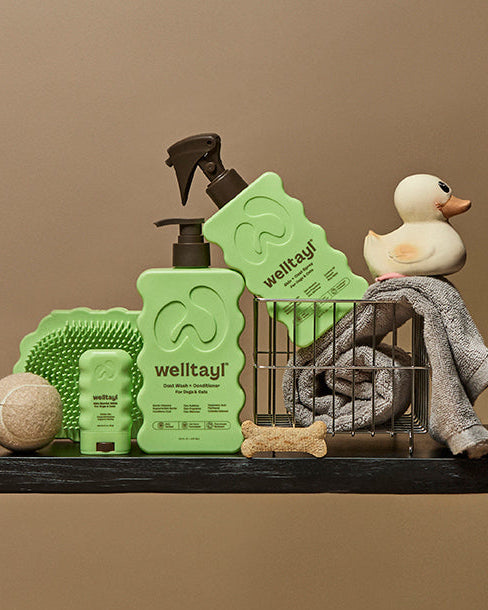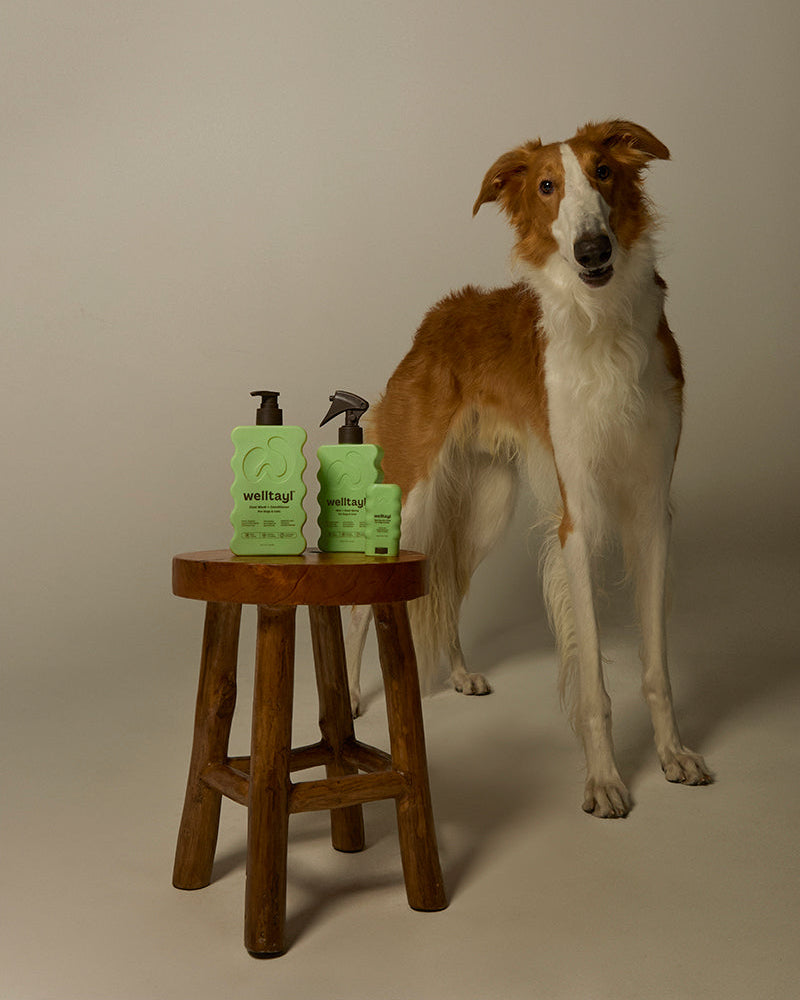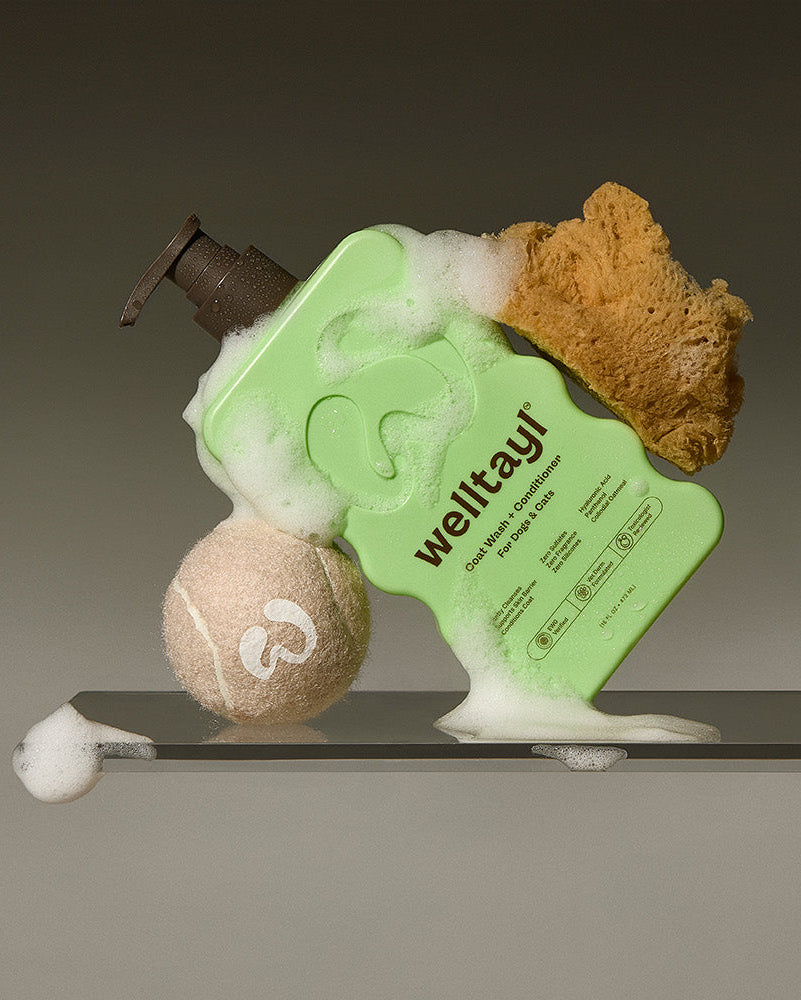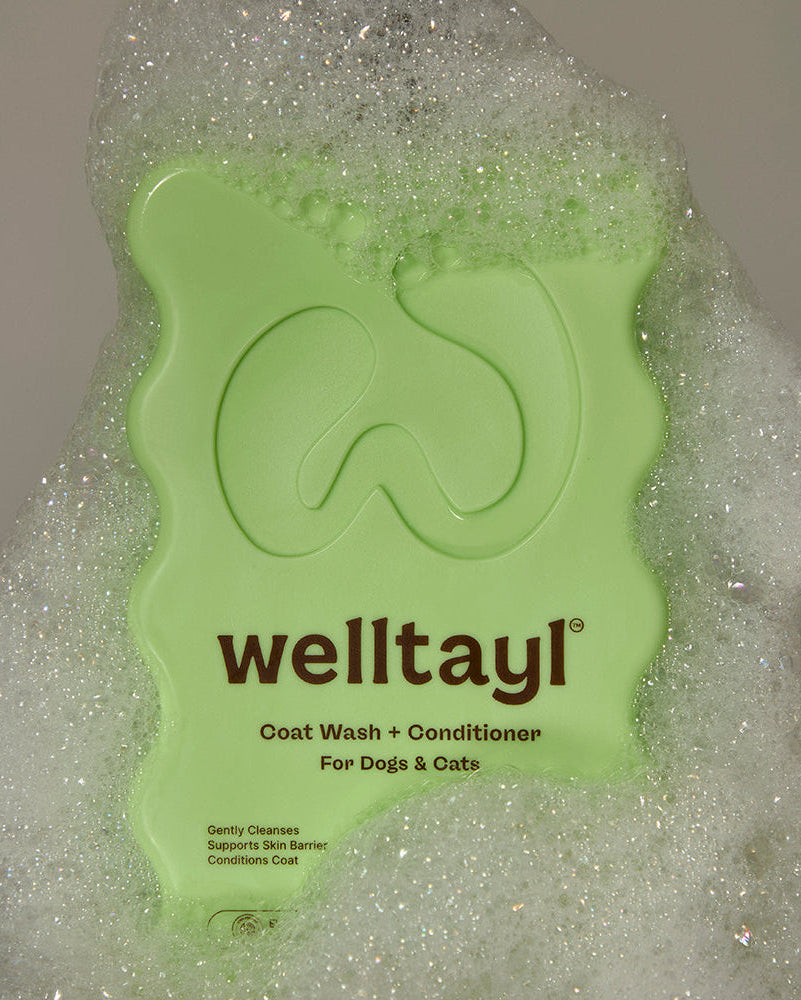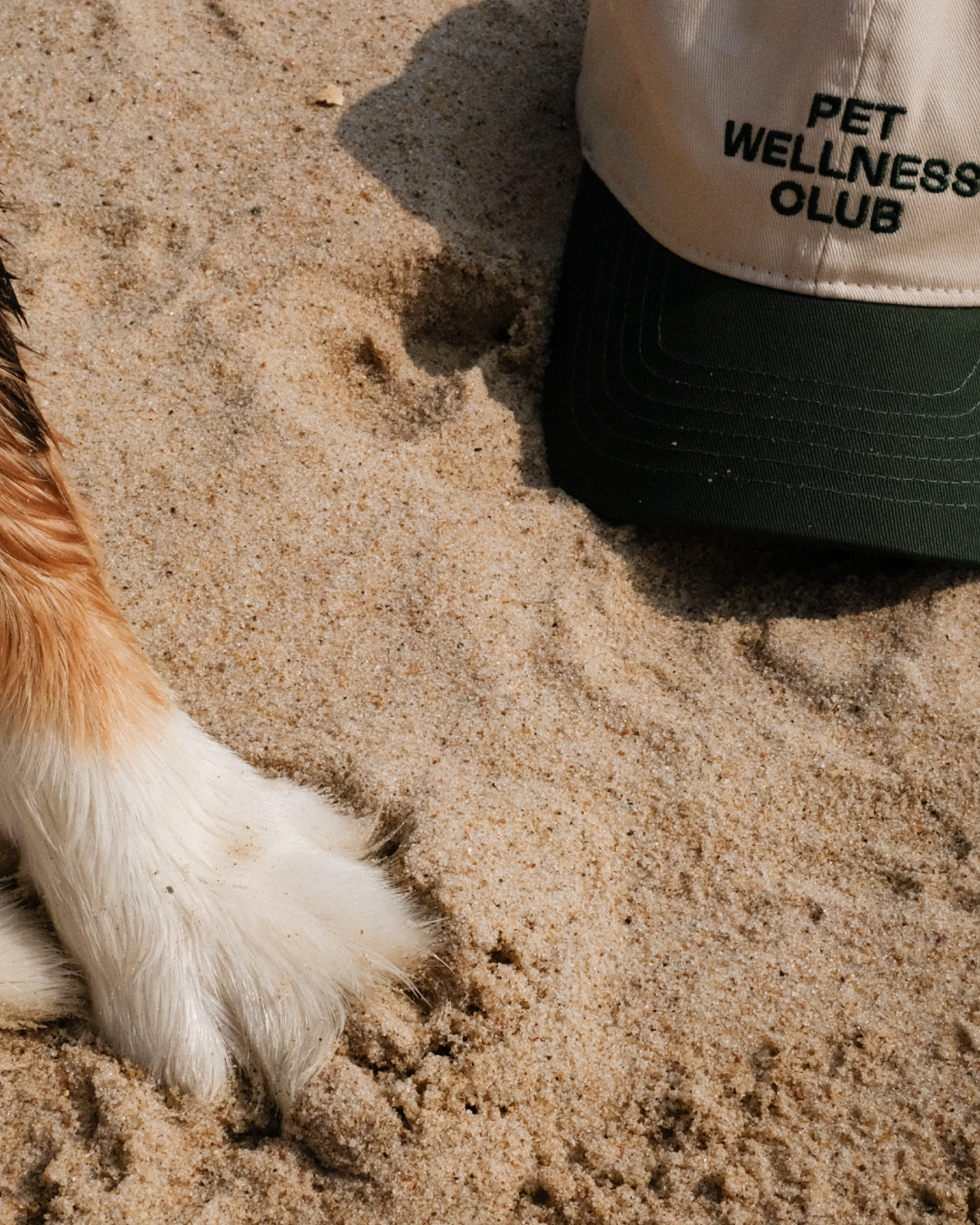Is your dog scratching a lot or pulling out their fur? Dry skin could be the culprit. Just like people, dogs can suffer from dry, itchy skin, which could be a result of seasonal changes, like extreme cool or warm weather. Dry, flaky skin is uncomfortable for your pet, and can put them at risk for more serious problems, like painful skin infections.Common causes of dry skin in dogs include: allergies, underlying diseases, like hormone imbalances, allergies, diet, and genetics. Dogs who enjoy extended time swimming may also suffer from dry skin. Imagine how you feel after a long day at the pool—your skin feels tight and itchy, right? It’s similar for dogs. Fortunately, there are simple ways to help your dog feel better and keep that dry skin at bay.
Table of Contents:
- Key Takeaways
- Causes of Dry Skin in Dogs
- Treatment Strategies for Managing Dry Skin
- Natural Remedies for Dogs with Dry Skin
- Commercial Products to Help Treat Dry Skin in Dogs
- When to Seek Veterinary Help for Dog's Dry Skin
- Prevention Tips for Dry Skin in Dogs
- Frequently Asked Questions
Key Takeaways
- 💧 Causes of Dry Skin: Factors include environmental conditions like low humidity, cold environments, frequent swimming which depletes natural oils, dietary deficiencies, particularly a lack of essential fatty acids, and underlying health issues such as hypothyroidism or allergies.
- ❗️ Symptoms to Watch: Dry skin symptoms in dogs manifest as excessive scratching, hair loss, dandruff, and visible irritation like redness or rashes. It's essential to observe these signs early to manage the condition promptly.
- 🛁 Treatment Approaches: Always consult with your veterinarian to rule out underlying diseases that may be causing dry skin. Treatments may include enhancing their diet with veterinary-approved essential fatty acid supplements to support the skin barrier, and using moisturizing shampoos during baths.
- 🧽 Natural Remedies: Safe and natural treatments include using oatmeal or aloe-based shampoos to soothe irritation.
- 🧴 Professional Products: For persistent dry skin, specially formulated dog shampoos and conditioners can help maintain skin moisture and health. Medicated products may be required for severe conditions as directed by a vet.
- 🧑⚕️ When to Seek Vet Help:The occasional itchy or dry skin may not be cause for concern, but chronic dry, itchy skin should be addressed by your family veterinarian to rule out underlying problems like atopy or hormonal diseases.
- 🐕 Preventative Measures: Regular grooming, proper nutrition, and maintaining a suitable living environment with adequate humidity levels are key to preventing dry skin. Yearly, or more frequent veterinary check-ups will help catch potential issues early.

Causes of Dry Skin in Dogs
Dry skin in dogs can result from a variety of factors which disrupt skin health, making their coats less vibrant and their skin flaky and itchy. Understanding the reasons behind your dog's dry skin is crucial before you can effectively treat it. Here are some common causes:
- Environmental Conditions: Just like people, dogs can get dry skin due to low humidity environments especially during the winter. Heating systems in homes can also reduce the moisture in the air, contributing to dry skin issues.
- Water Activities: Dogs who love swimming may be prone to dry skin. Prolonged exposure to water strips away natural oils from their skin which are essential for keeping their skin moist and healthy.
- Dietary Deficiencies: A lack of essential fatty acids in your dog’s diet can lead to dry skin. Essential fatty acids, like omega-3 and omega-6, play a significant role in skin health, supporting natural skin oils, healthy coats and reducing inflammation.
- Health Conditions: Some health issues like hypothyroidism, Cushing’s disease, atopy or skin infections can cause dry skin. These conditions disrupt the normal function of the skin, leading to various symptoms including dryness.
- Allergies: Dogs can be allergic to a range of substances like food, environmental allergens, and parasites. Allergic reactions often cause skin irritation and dryness.
Treatment Strategies for Managing Dry Skin
To alleviate and manage dry skin in dogs, consider the following treatment options:
- Vet Consultation: If your dog shows signs of dry skin, it's important to consult your vet promptly. Early intervention can help identify the cause and prevent further discomfort or health issues.
- Improved Diet: Incorporate foods rich in fatty acids or consider supplements that provide omega-3 and omega-6. These nutrients help restore the natural oils in your dog's skin. (Always consult your veterinarian before making any diet changes, as sudden changes may exacerbate the problem).
- Moisturizing Shampoos: Use shampoos designed for dogs with dry skin, like the Welltayl Coat Wash + Conditioner. These products are typically milder and infused with moisturizing agents to help soothe the skin and replenish moisture.
- Regular Grooming: Regular brushing helps distribute the dog's natural oils throughout the coat, maintaining skin hydration and removing dead hair and skin flakes.
If your dog experiences persistent dry skin, joining the Welltayl newsletter can provide you with more insights and updates on how to manage this condition effectively.
Natural Remedies for Dogs with Dry Skin
Omega-3 Fatty Acids
Incorporating a veterinary-formulated Omega-3 fatty acid supplement into your dog's diet can promote skin and coat health. Omega-3s help reduce inflammation, making them effective for treating dry skin on dogs. Always consult your vet before adding supplements to ensure the right dosage.
Oatmeal Baths
A dog-formulated oatmeal based shampoo can provide soothing properties to calm your dog’s dry skin and provide added comfort.
Don't miss out on valuable health tips for your pet. Join the Welltayl community today by subscribing to our newsletter. Let us help you ensure your dog stays happy, healthy, and well-cared for.

Commercial Products to Help Treat Dry Skin in Dogs
Natural remedies may be useful for the occasionally itchy skin. A variety of commercial products like special dog shampoos, moisturizing conditioners, and soothing lotions and balms can also support your dog’s skin health.
Shampoos
Selecting the right dog shampoo can make a significant difference in managing your pet's dry skin. Medicated shampoos containing hydrocortisone or oatmeal are particularly effective in reducing inflammation, soothing irritation, and relieving discomfort. It's important to follow your veterinarian’s guidance on the frequency of bathing, as excessive washing can strip the skin of its natural oils, potentially worsening dryness.
Select shampoos made with gentle ingredients that cleanse without removing natural oils. Seek out options that contain soothing elements like oatmeal to provide necessary moisture and comfort to the skin.Medicated shampoos containing hydrocortisone can reduce inflammation and discomfort. It’s crucial to follow your veterinarian’s instructions on frequency of use, as over-bathing can exacerbate skin dryness.
Moisturizing Conditioners
After using a gentle shampoo, applying a moisturizing conditioner can help seal in hydration and protect your dog's coat. Using conditioners can help nourish the skin and leave the fur silky and smooth. They also assist with detangling, making regular grooming sessions easier and more effective—an essential step in maintaining healthy skin for your dog. Generally, a well-conditioned coat sheds less and retains more natural oils.
Dog Lotions and Balms
Dog lotions and balms can be excellent for spot treatments. They are typically applied on patches of extremely dry or irritated skin to create a barrier that locks in moisture and shields against harmful irritants. When choosing a lotion or balm, opt for ones that are specifically formulated for dogs, with all-natural ingredients to ensure safety if your dog decides to lick it off. These products can be applied directly to your dog's skin, providing immediate relief from itchiness and promoting healing.
When to Seek Veterinary Help for Dog's Dry Skin
In some cases, the occasional episode of mild, dry skin in dogs may be managed at home with the right care and products. However, severe, or chronic dry, itchy skin should always be addressed by a veterinarian.
Persistent Dry Skin
If your dog's dry skin continues despite your best efforts with natural remedies and over-the-counter products, it's time to bring your best friend to the veterinarian. Chronic, dry, and itchy skin can be a symptom of underlying health issues including hormonal imbalances, autoimmune disorders, nutritional deficiencies, environmental allergies, or parasites, bacteria or fungal infections..
Common l signs that dry skin is becoming a chronic issue include:
- Ongoing itching despite the use of moisturizers and specialized shampoos
- Dandruff that doesn't improve or worsens
- Dry, brittle hair that breaks easily
- Red or inflamed skin
- Hair loss
- Persistent itching, licking, or scratching
Always monitor your dog’s condition and if you don't see improvement within a few days, make an appointment with your vet. For more useful tips on taking care of your dog's skin and to stay updated on the latest pet care strategies, consider joining the Welltayl newsletter.
Severe Skin Conditions
Dry skin may escalate into more severe skin conditions that are uncomfortable for your pet, and may be the first clue that your dog is suffering a serious health problem. Signs may include the following severe symptoms:
- Extreme redness, swelling, or soreness
- Open wounds or oozing sores
- Excessive loss of fur in large patches
- Bad odor from the skin or coat
- Persistent licking at one or multiple locations
- Sleep disruptions
- Lethargy
- Weight loss or weight gain
If you notice any of these severe signs, do not delay in contacting your vet. Early treatment can prevent more serious health issues and relieve your dog’s discomfort more quickly. Your veterinarian will perform a thorough physical exam and may recommend various diagnostic tests to determine the underlying problem. Treatment may include prescription oral or topical medications.
Prevention Tips for Dry Skin in Dogs
Maintaining your dog's skin health is a part of responsible dog ownership, and essential to prevent more serious health issues. Follow these tips to help keep your pet's skin healthy:
Proper Nutrition
Feed your dog an AAFCO-approved diet for their life stage, breed and activity level to ensure they receive proper nutrition for overall health and proper organ function. Adding supplements, like veterinary-formulated fish oil, can further support their coat and skin condition, but always consult your vet before introducing any new supplement to your dog's diet.
Regular Grooming
Regularly brush your dog to manage dry skin effectively. Brushing them several times a week helps to distribute natural oils evenly across the skin, reducing flakiness and improving overall skin condition. Baths are beneficial too, but limit them to once a month (unless otherwise specified by your vet for certain breeds and conditions) using a mild, moisturizing shampoo to avoid stripping away essential oils.During grooming, inspect their skin for signs of irritation or infection, and address any issues promptly to avoid complications.
Avoiding Allergens
Identify and minimize exposure to allergens that can exacerbate dry skin. Common irritants include certain laundry detergents, household cleaners, and synthetic fibers. Use gentle products whenever possible. Additionally, after outdoor activities, wipe your dog down with a wet cloth to remove potential allergens like pollen or mold from their fur.
Hydration
Ensure your dog is properly hydrated because it is essential for maintaining healthy skin. Provide constant access to fresh, clean water. You can increase moisture intake by incorporating wet food into their diet. Also, consider using a humidifier in your home during dry months to help maintain optimal humidity levels, which can benefit both your family and your pets.
The Importance of Regular Checkups
Ensuring your dog has regular veterinary checkups is critical to maintaining their skin health. Your veterinarian will perform a nose-to-tail examination and identify early signs of skin issues, like dry skin or allergies, before they become more severe. Think of these checkups as your dog’s personal health audits to keep your dog in top shape. If your dog's skin appears flaky or irritated, it’s time to visit the vet. Regular checkups also give you a chance to discuss your dog’s diet and grooming routine, which can impact skin health.
For ongoing tips on dog health and wellness, join the Welltayl newsletter at welltayl.com for expert advice delivered right to your inbox.
Ongoing Skin Care for Your Dog
Continuous care is key to preventing dry skin issues in dogs. Incorporate a complete and balanced diet rich in Omega-3 and Omega-6 fatty acids, which nourish the skin from the inside out. Remember, a well-groomed dog is less likely to have skin issues, so regular brushing and bathing with the right products is essential. Hypoallergenic shampoos designed for dogs with sensitive skin may be recommended if your pet is prone to skin problems.
Hydration is equally important; always ensure your dog has access to fresh water, as dehydration can lead to dry skin. Also, monitor your dog's environment—reducing exposure to allergens can prevent skin reactions.
FAQ About Dry Skin in Dogs
Should I Moisturize My Dog's Skin?
Dogs have natural oils and generally do not require added moisture. However, dog’s who suffer from dry skin, or other underlying health issues may require veterinary-prescribed treatments to support their skin barrier.
Why Does My Dog Have Dry, Flaky Skin and Scabs?
Dry, flaky skin and scabs in dogs can be caused by numerous factors including parasites, allergies, and environmental conditions. Fleas, lice, and mites such as Sarcoptic mange often contribute to dry skin and visible scabs. Low humidity, especially in winter, can also lead to dry skin for dogs. Regular checkups with your vet can help diagnose the exact cause and provide the right dog dry skin treatment.
Resources:
1. "Dry skin in dogs with specific conditions," PubMed
2. "Benefits of Omega 3 to dog’s skin," PubMed
3. "Moisturizers for dogs with dry skin," PubMed
4. "Skin soothing effects of aloe and coconut oil," PubMed
5. "Contact allergies in dogs," PubMed
6. "Influence of diet on skin issues," NCBI
Read more

Discover how to protect your dog from harmful UV rays, ensuring your dog is safe when enjoying sunbathing.

Learn the best practices for grooming your dog at home. Keep your pet looking great and feeling healthy with our expert advice. Start grooming now!


